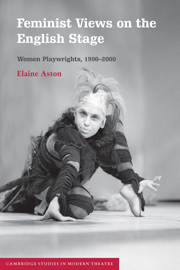Book contents
- Frontmatter
- Contents
- Acknowledgements
- 1 A feminist view on the 1990s
- 2 Telling feminist tales: Caryl Churchill
- 3 Saying no to Daddy: child sexual abuse, the ‘big hysteria’
- 4 Girl power, the new feminism?
- 5 Sarah Kane: the ‘bad girl of our stage’?
- 6 Performing identities
- 7 Feminist connections to a multicultural ‘scene’
- 8 Feminism past, and future? Timberlake Wertenbaker
- 9 Tales for the twenty-first century: final reflections
- Notes
- Bibliography
- Index
3 - Saying no to Daddy: child sexual abuse, the ‘big hysteria’
Published online by Cambridge University Press: 22 September 2009
- Frontmatter
- Contents
- Acknowledgements
- 1 A feminist view on the 1990s
- 2 Telling feminist tales: Caryl Churchill
- 3 Saying no to Daddy: child sexual abuse, the ‘big hysteria’
- 4 Girl power, the new feminism?
- 5 Sarah Kane: the ‘bad girl of our stage’?
- 6 Performing identities
- 7 Feminist connections to a multicultural ‘scene’
- 8 Feminism past, and future? Timberlake Wertenbaker
- 9 Tales for the twenty-first century: final reflections
- Notes
- Bibliography
- Index
Summary
In Churchill's Far Away, introduced briefly to conclude the last chapter, Joan probes the violent ‘secrets’ of her uncle's house. The tale the child tells in the opening scene is of people and children hidden in a lorry and attacked, hit by her uncle. The child has discovered ‘something secret’ and the aunt asks her to keep the secret. ‘Sometimes’, she explains, ‘you get bad children who even betray their parents.’ Yet, as Far Away Illustrates, coercing the child into keeping violence within the home a secret has long term damaging consequences, not least for the child herself.
One particular form of damage to the child concerns me in this chapter: child sexual abuse. Where, as the previous chapter showed, Churchill figuratively expresses the damage done to young women and children, especially in The Skriker, others have elected to focus more concretely on abuse as an issue for the 1990s, albeit in a range of theatrical forms and with different, but related, concerns. With this in mind, I begin this chapter with an account of plays by Sarah Daniels from the early 1990s that concentrated on child abuse as a key issue. The chapter then progresses through a range of work that offers a dramatic treatment of abuse that insists on exposing rather than keeping secrets: Augustine (Big Hysteria), Anna Furse; Easy Access (for the Boys), Claire Dowie; and Frozen, Bryony Lavery.
- Type
- Chapter
- Information
- Feminist Views on the English StageWomen Playwrights, 1990–2000, pp. 37 - 58Publisher: Cambridge University PressPrint publication year: 2003
- 1
- Cited by



